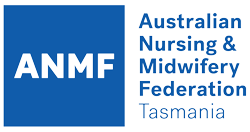Shining a Light on the Acute Care Sector
3 November 2021
Media Doorstop
Who: Emily Shepherd, ANMF Tasmanian Branch Secretary and Rebecca Ilie, HERC Nurse Educator
When: 12.30pm (vision opportunity), 12.45pm doorstop
Where: C3 Convention Centre, 64 Anglesea Street, South Hobart
The Australian Nursing and Midwifery Federation Tasmanian Branch (ANMF) is holding its annual Acute Care Conference TODAY at the C3 Conference Centre in South Hobart.
The conference is unique opportunity for nurses and midwives working in acute care to increase the breadth of their skills and knowledge with best practice presentations on nursing and midwifery practice as well as the acute care sector. It provides the perfect opportunity to hear from industry leaders about current topics and cutting-edge research as well as leading policy and practice developments. It also focuses on advanced clinical practice in all clinical spaces.
Guest Speakers include Robyn Withers – Registered Nurse and Midwife, Dr Victor Ilie – Urology Consultant, Bebe Brown – Associate Nurse Unit Manager and Dr Andrew Ottoway – Specialist Anaesthetist, to name a few.
ANMF Tasmanian Secretary and HERC CEO Emily Shepherd, who is opening the conference, says “every kind of modern nursing role in every sector is demanding, but acute care represents one of healthcare’s most challenging disciplines, particularly as present. As a front-line health responder, acute nurses and midwives are called upon to perform a wide variety of assessment, treatment and support modalities and must be prepared for diverse situations every day”.
Acute care involves the treatment of patients diagnosed with short term but serious conditions – and might take place in a number of clinical settings like Accident & Emergency, Intensive Care and Neonatal Care. An example of an acute care presentation that a nurse may be required to respond to may be a patient presenting to the emergency department with severe injuries following a car or bike accident or an acute chronic illness like infective chronic obstructive pulmonary disease, to strokes and infectious diseases.
“Due to living in a COVID-19 world, it’s imperative acute care professionals are given the ongoing professional development, support and education on leading interventions in order to evolve in their practice with an ever-increasing demand on their skills in the acute care sector. Not only are nurses and midwives providing acute care and treatment, but they must also have a huge breadth and depth of knowledge to understand patients’ co-morbidities and have excellent communication skills to engage with patients and their families in what are often some of the most challenging circumstances they may face in their lifetime,” Ms Shepherd said.
Acute care happens everywhere, and it is vital that we recognise that all nursing areas of health have the potential to learn advanced clinical skills to ensure a fast and effective approach to patient care.
-End
Media contact:
Emily Shepherd, ANMF Tasmanian Branch Secretary
Mobile: 0400 884 021
Email: Emily.Shepherd@anmftas.org.au
